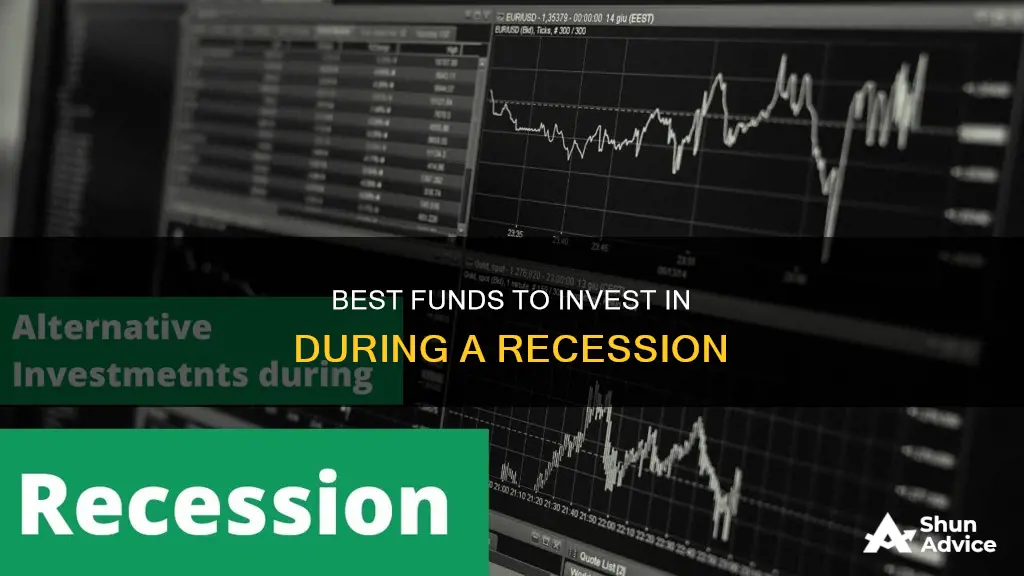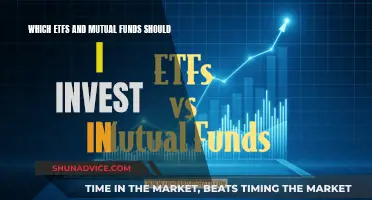
While there are no recession-proof investments, there are some options that are safer than others. Here are some of the best funds and strategies to consider during a recession:
1. Federal Bond Funds: These are considered relatively safe, as they are backed by the government's ability to levy taxes and print money, eliminating default risk.
2. Municipal Bond Funds: Issued by state and local governments, these funds provide a high degree of safety and security, although they carry slightly more risk than federal bonds.
3. Taxable Corporate Funds: Offered by corporations, these funds provide higher yields than government-backed issues but come with increased risk.
4. Money Market Funds: While ultra-conservative, these funds are suitable for short-term investments and provide a high level of safety.
5. Utilities Mutual Funds: These funds focus on investing in companies that pay predictable dividends, such as utilities and consumer staples.
6. Large-Cap Funds: Larger companies tend to be more stable during volatile economic conditions and have a lower risk of going out of business.
7. Sector-Specific Funds: Funds that track specific sectors, such as healthcare and consumer staples, can be less risky than individual stocks and provide exposure to resilient sectors.
8. Dividend-Yielding Investments: Dividend stocks and dividend ETFs offer routine cash payments and stable cash flow, even during recessions.
9. Fixed-Income Investments: Bonds provide periodic payments and are considered safer than stocks during economic downturns.
10. Broad Funds and Diversification: Investing in a diverse range of equities, bonds, and alternative assets can help reduce the impact of market volatility.
| Characteristics | Values |
|---|---|
| Stock sectors | Health care, consumer staples, communication services, information technology |
| Stock type | Large-cap stocks, dividend-paying stocks |
| Investment type | Broad funds, bonds, dividend stocks, fixed-income investments, index funds, ETFs |
| Other | Gold, cash and cash equivalents, money market funds, real estate |
What You'll Learn

Defensive stocks, e.g. consumer staples and utilities
Defensive stocks are a good option to consider during a recession. Defensive stocks are shares in companies that show stable performance regardless of the state of the economy. They are also called non-cyclical stocks because they are less prone to the economic cycle of expansions and recessions.
Defensive stocks are typically found in sectors that produce consumer staples or necessities. This includes utilities, healthcare, food and beverage companies, household and personal products, and packaging. These companies tend to have strong cash flows and stable operations, and their products are in constant demand.
- Procter & Gamble
- Johnson & Johnson
- Philip Morris International
- Coca-Cola
- B&G Foods Inc
Defensive stocks can be a good way to reduce the volatility of your portfolio during a recession. They tend to have lower risk and provide stable and consistent dividends. However, they may also have smaller gains during bull markets.
Best TSP Funds to Invest in Now
You may want to see also

Large-cap stocks
However, it is important to remember that even large-cap stocks are not completely immune to severe economic downturns.
When investing in large-cap stocks during a recession, it is advisable to take a long-term approach. This means not checking your portfolio too often, as this can lead to panic selling. It is also important to ensure you have enough emergency savings and that you are not planning to touch your investments for at least five to seven years.
Some examples of large-cap stocks to consider during a recession include:
- Vanguard Dividend Appreciation ETF (VIG)
- SPDR Gold Shares (GLD)
- Schwab U.S. REIT ETF (SCHH)
IRA and Mutual Funds: A Smart Investment Strategy?
You may want to see also

Broad funds
When a recession hits, it can be tempting to abandon the stock market altogether. But doing so can translate to significant losses. Maintaining a long-term perspective is important.
- Federal Bond Funds: These are considered one of the safest investments as they are backed by the U.S. government's ability to levy taxes and print money. They offer principal protection and eliminate the risk of default.
- Municipal Bond Funds: Issued by state and local governments, these funds provide a high degree of safety and security to investors. While they carry more risk than federal funds, they are still relatively safe.
- Taxable Corporate Funds: Offered by corporations, these funds provide higher yields than government-backed issues but carry more risk. Choosing a fund that invests in high-quality bond issues can help lower this risk.
- Money Market Funds: These funds are ultra-conservative and provide a high degree of safety. However, they are best suited for short-term investments.
- Dividend-Yielding Investments: Dividend-yielding investments, such as dividend stocks or dividend ETFs, provide routine cash payments to investors. Dividend stocks split a portion of the company's profits with shareholders based on the number of shares they own. Dividend ETFs are made up of companies known for paying strong dividends. Reinvesting dividends can help lower the volatility of your portfolio.
- Large-Cap Stocks: Stocks of larger, well-run companies are generally considered less volatile than small-cap stocks. They tend to have more stable revenues and profits due to constant demand for their products or services. Examples of sectors that tend to be less sensitive to economic downturns include consumer staples, utilities, and healthcare.
Remember, it's important to do your own research and consult with a financial professional before making any investment decisions.
Axis Mutual Fund: Invest Directly with Ease
You may want to see also

Fixed-income investments
When considering dividend-yielding investments, look for companies with a strong track record of paying and increasing dividends. This can lead to stable cash flow even during recessions. Dividend stocks can be individual stocks or dividend ETFs, which are made up of companies known for paying strong dividends.
When it comes to bonds, government bonds are considered low-risk since they are backed by the government's credit. They are also less risky than stocks and can add stability and income to a portfolio. Bonds issued by financially strong corporations are known as investment-grade bonds and are another appealing option in a downturn. While they carry more risk than government bonds, they generally offer higher yields.
It's important to remember that while fixed-income investments can provide a source of income during a recession, they may not be as attractive during boom periods, such as a bull market. Additionally, the safer an investment seems, the lower the income you can expect from it.
Offshore Investment Funds: Global Wealth Management Strategy
You may want to see also

Dividend-yielding investments
- Investing in individual dividend stocks: If you're looking for specific dividend-yielding stocks to invest in, consider sectors such as healthcare and consumer staples. Companies in these sectors tend to outperform during recessions because they sell essential goods and services that people continue to purchase even during economic downturns. Examples include food and beverage companies, pharmaceutical companies, and retailers of household and personal products.
- Focus on large-cap stocks: Stocks of larger, well-established companies tend to be less volatile and more stable during recessions. Look for large-cap stocks with low debt, strong balance sheets, positive cash flow, and a history of stable revenues and profits.
- Consider dividend ETFs: Dividend ETFs (exchange-traded funds) are made up of companies known for routinely paying strong dividends. They provide diversification by holding a basket of dividend-paying stocks, reducing your risk of having too much exposure to a single stock.
- Look for consistency in dividend payments: When evaluating dividend-paying stocks or ETFs, focus on companies with a strong track record of consistently paying and increasing their dividends over time. This indicates good corporate governance and a lower risk of cutting dividend payments during a recession.
- Reinvest your dividends: Reinvesting dividends can help lower the volatility of your portfolio. Even if the stock market is down, reinvesting dividends can partially offset the downside and improve your overall returns.
- Don't chase high yields: When selecting dividend stocks, remember that yield shouldn't be the only or main factor in your decision. The highest yields often come with additional risk. Focus on consistency and stability of dividend payments rather than solely chasing the highest yields.
- Flowers Foods (FLO): Flowers Foods is the second-largest producer of packaged bakery foods in the US, selling brands such as Nature's Own, Wonder Bread, and Dave's Killer Bread. It has a dividend yield of 4.3% and a long history of uninterrupted dividends.
- WEC Energy (WEC): WEC Energy is one of the largest utilities companies in the US, providing electric and natural gas services. It has a dividend yield of 3.9% and has paid uninterrupted dividends for at least 20 years.
- Lockheed Martin (LMT): Lockheed Martin is the world's largest defense contractor and supplier of fighter aircraft. It has a dividend yield of 2.8% and a 29-year streak of uninterrupted dividend payments.
- McDonald's (MCD): McDonald's is a well-known fast-food chain with a dividend yield of 2.7% and a 46-year streak of uninterrupted dividends. Most of its restaurants are franchised, which helps shield the company from rising operating costs.
- Exxon Mobil (XOM): Exxon Mobil is an oil major with a long history of paying uninterrupted dividends, dating back to 1882. It has a dividend yield of 3.4% and benefits from its integrated business model, which provides diversification across the fossil fuel value chain.
Remember, past performance is not a guarantee of future results, and it's important to do your own research and consult with a financial advisor before making any investment decisions.
Maximizing Investment Returns: Strategies for Utility-Focused Investors
You may want to see also







